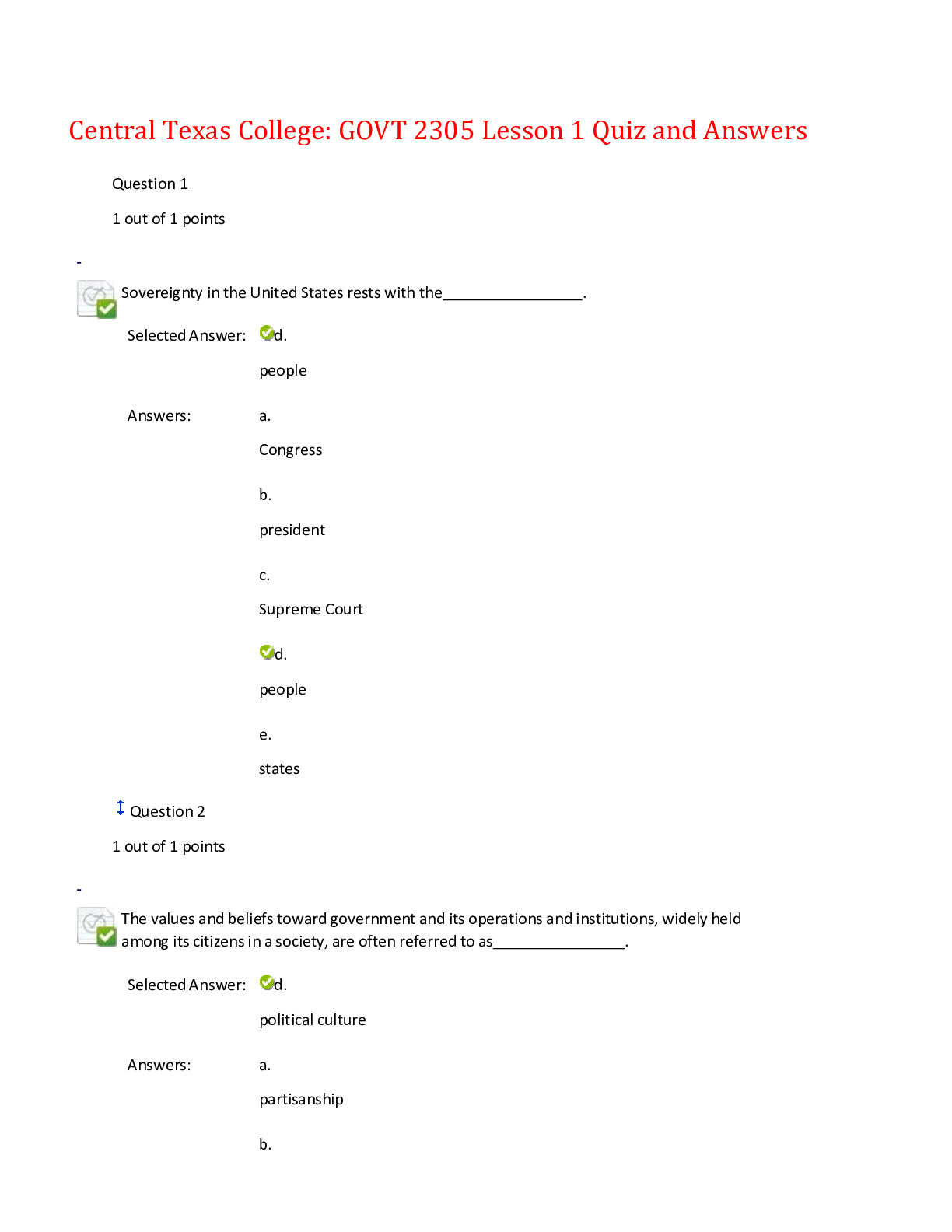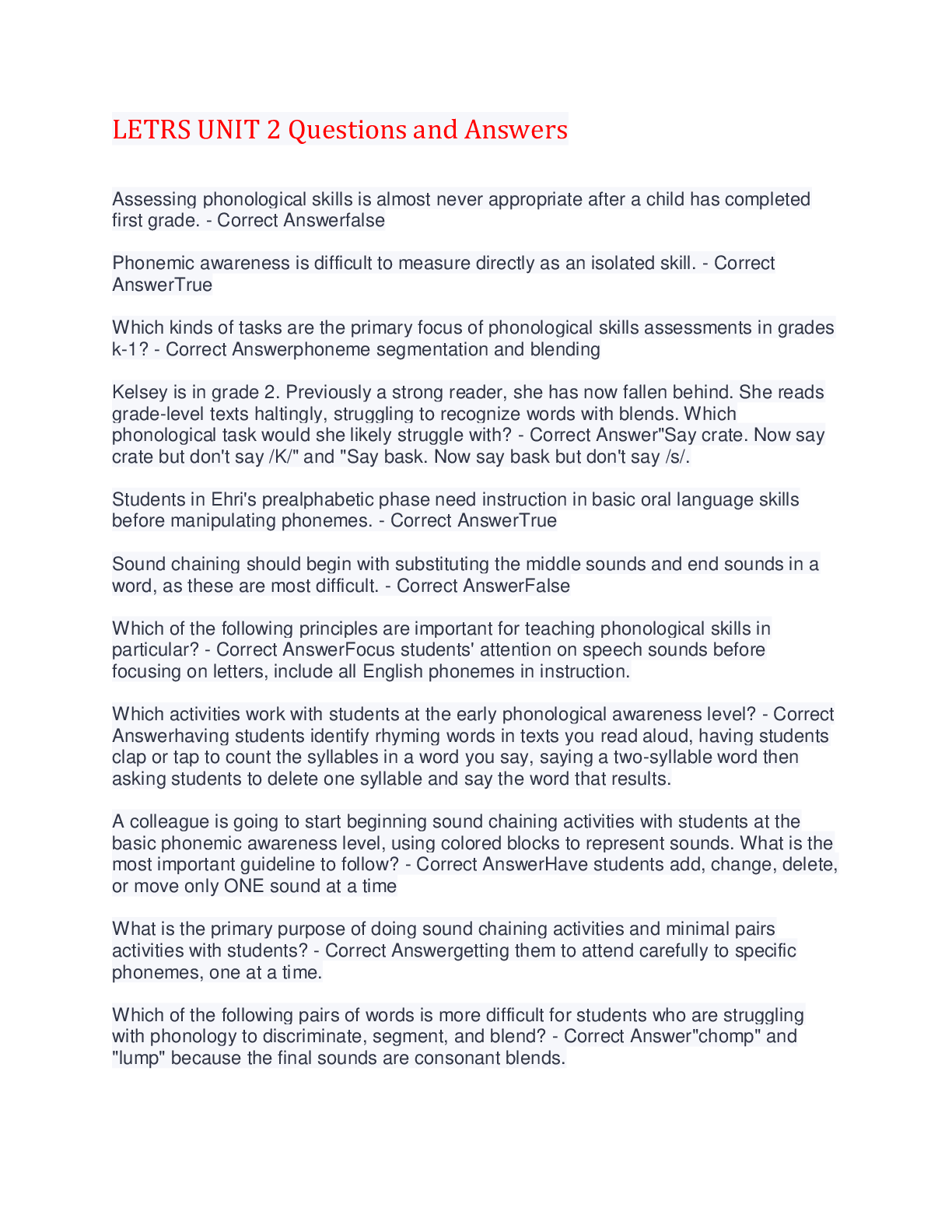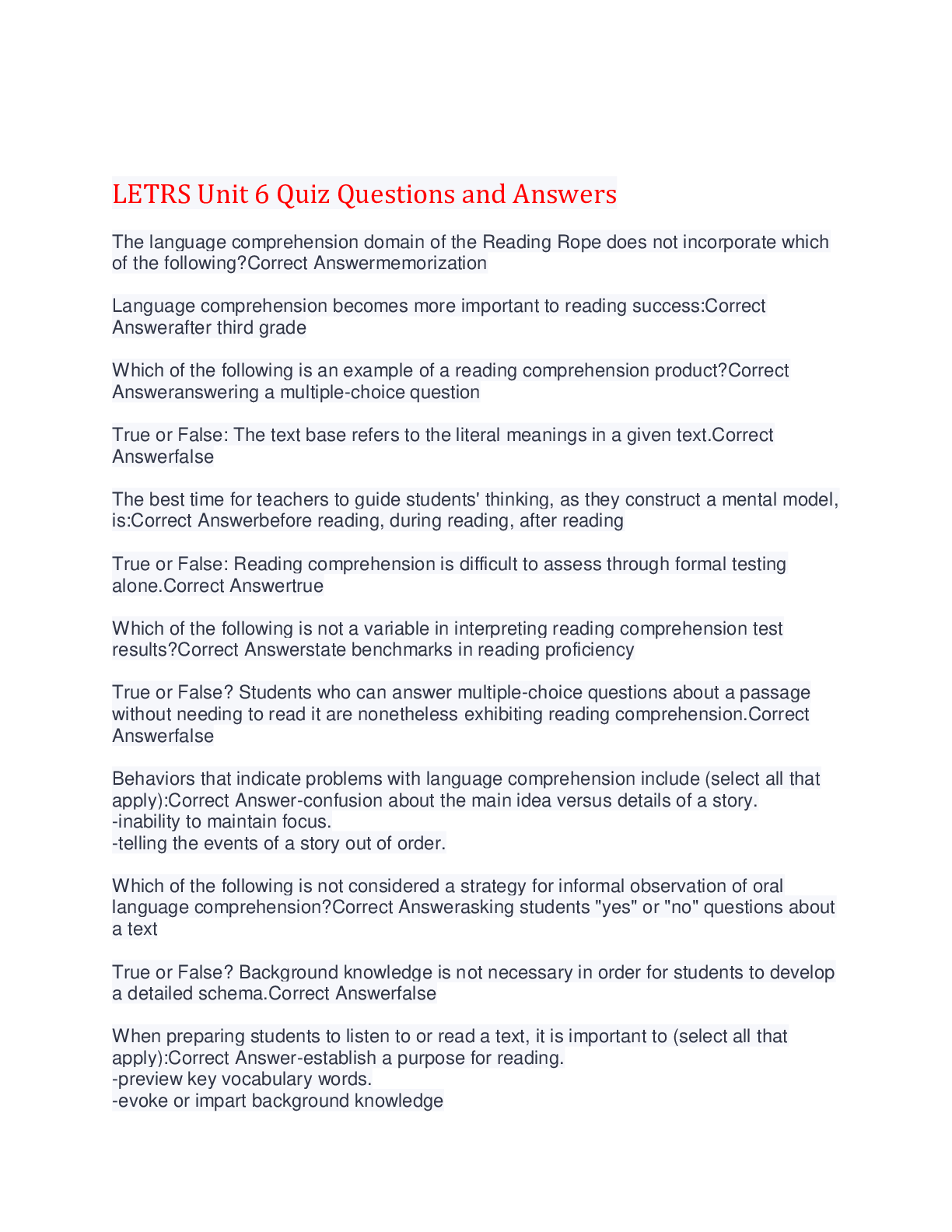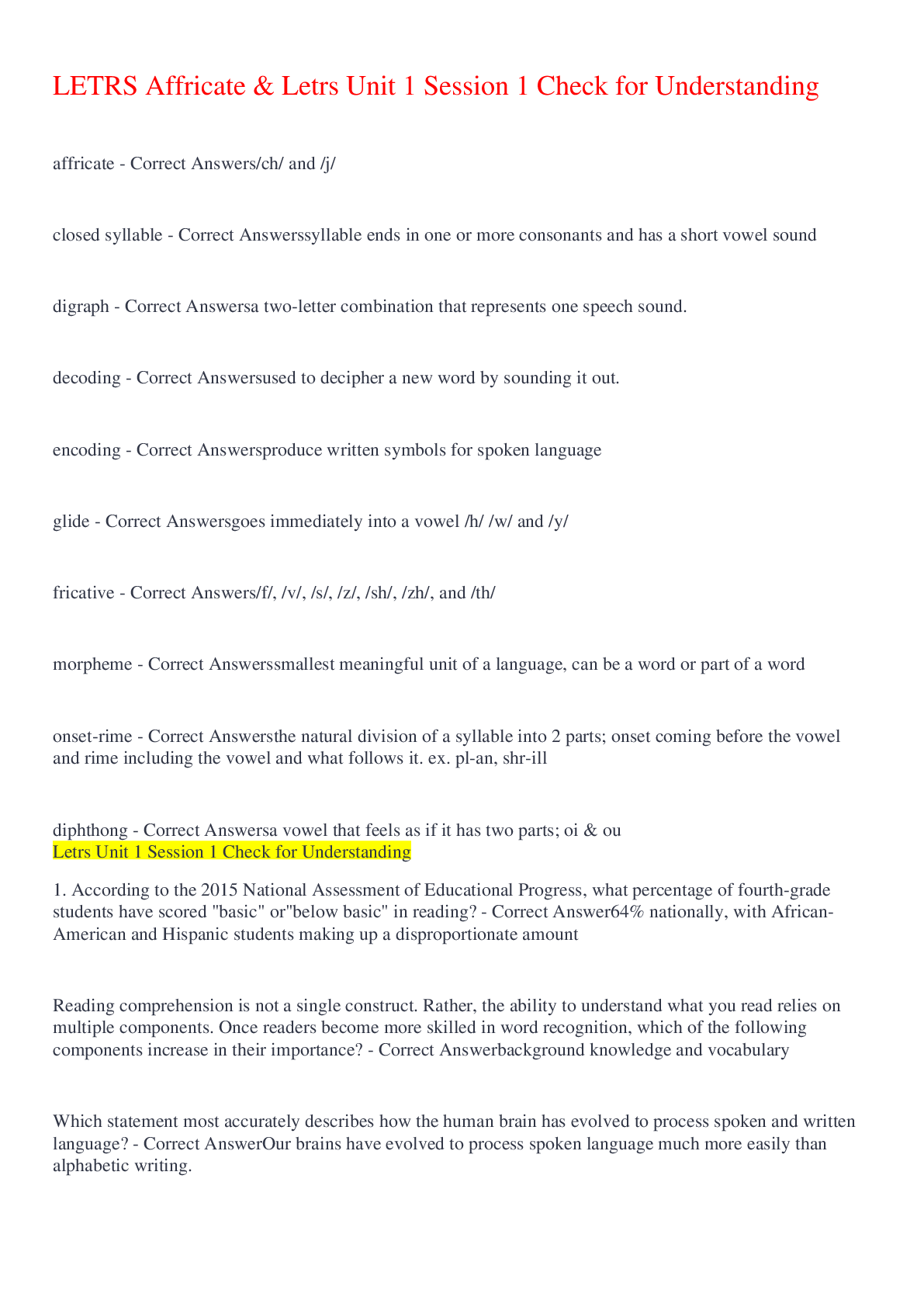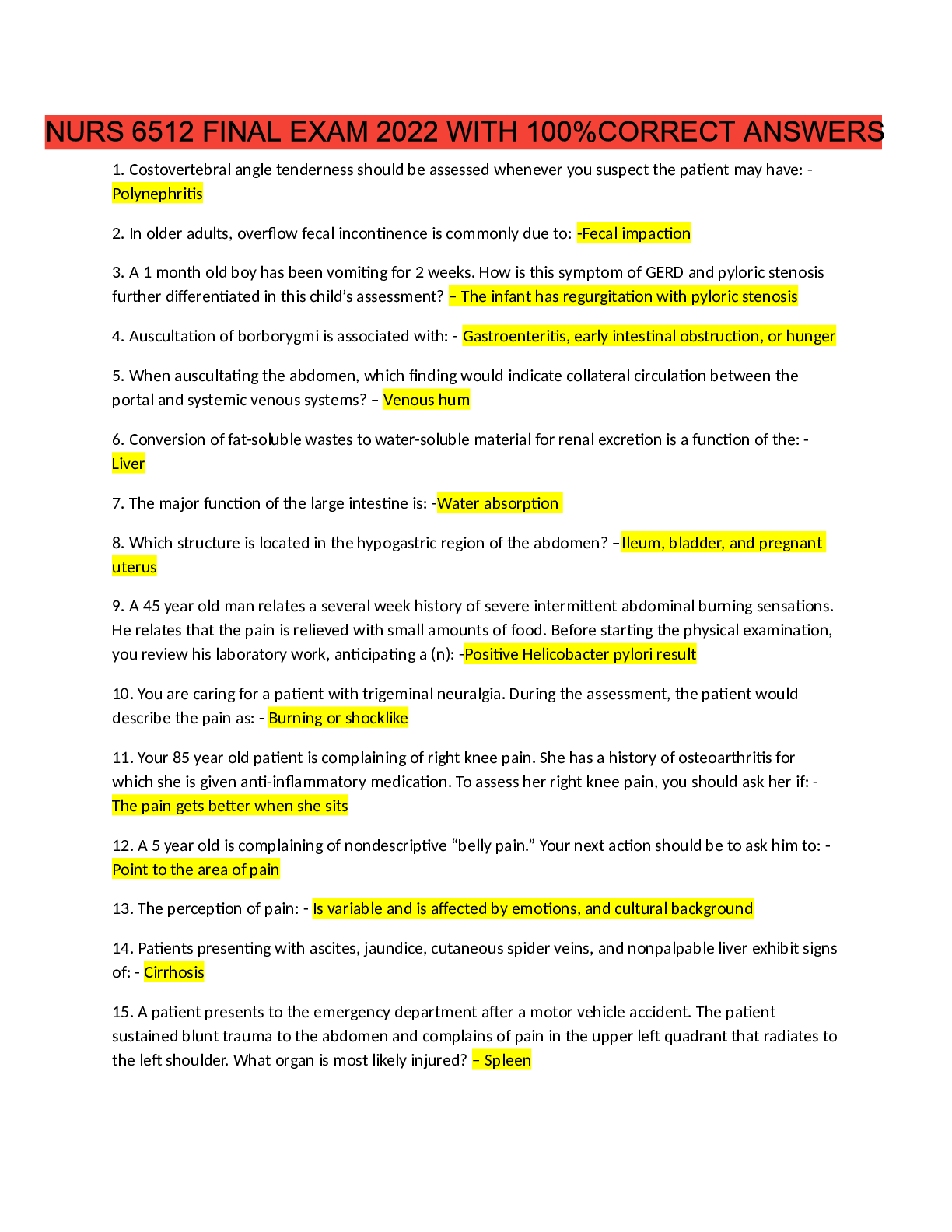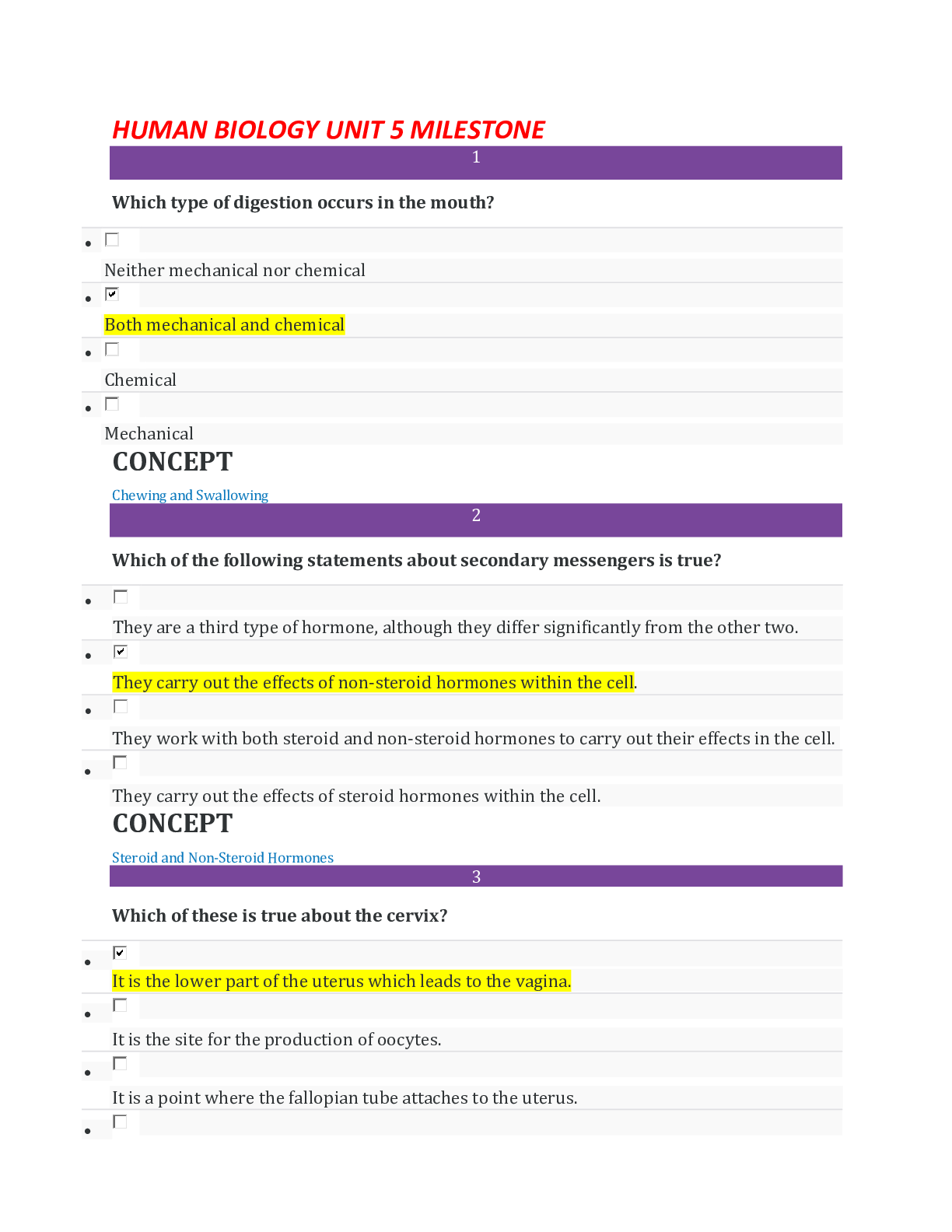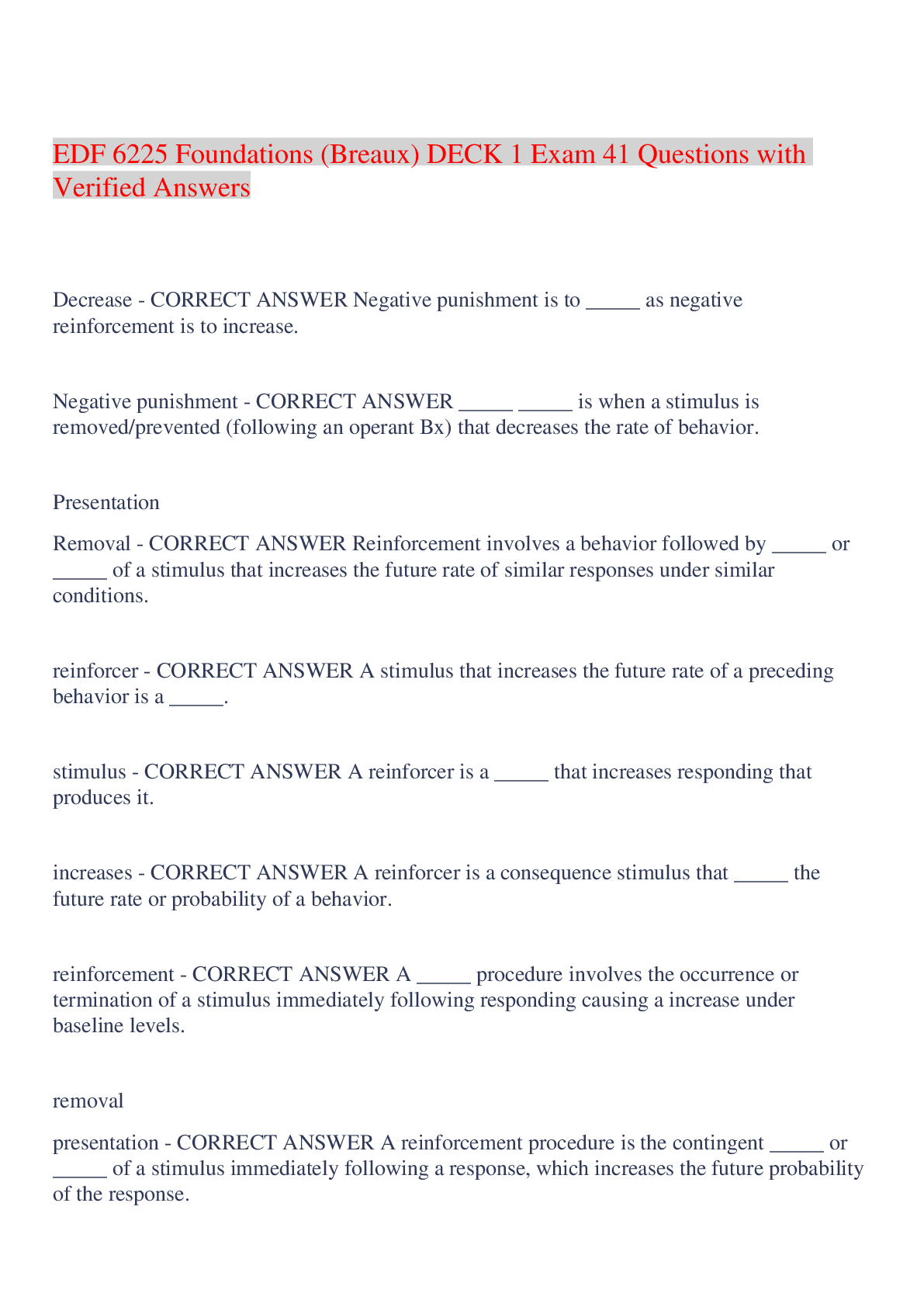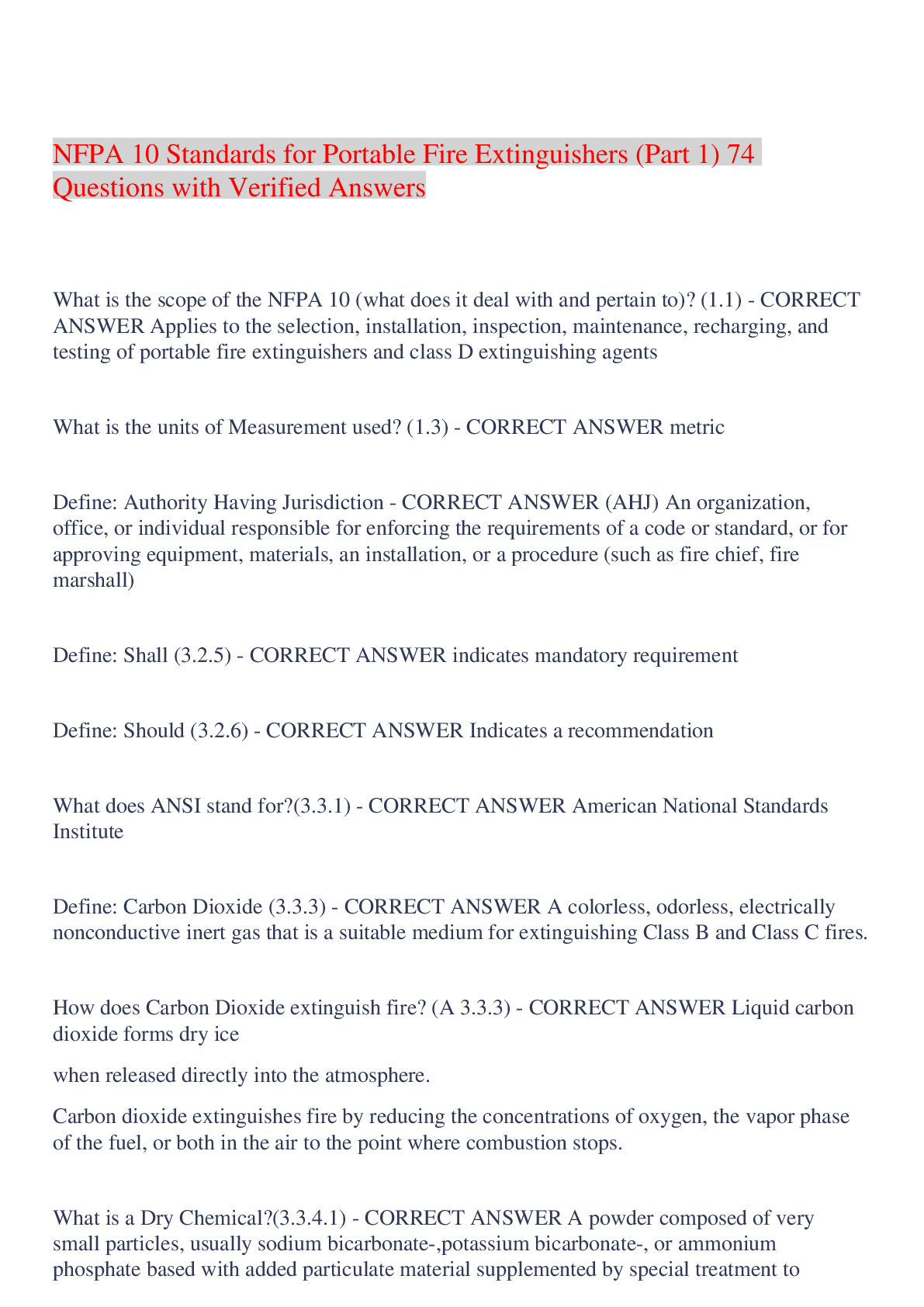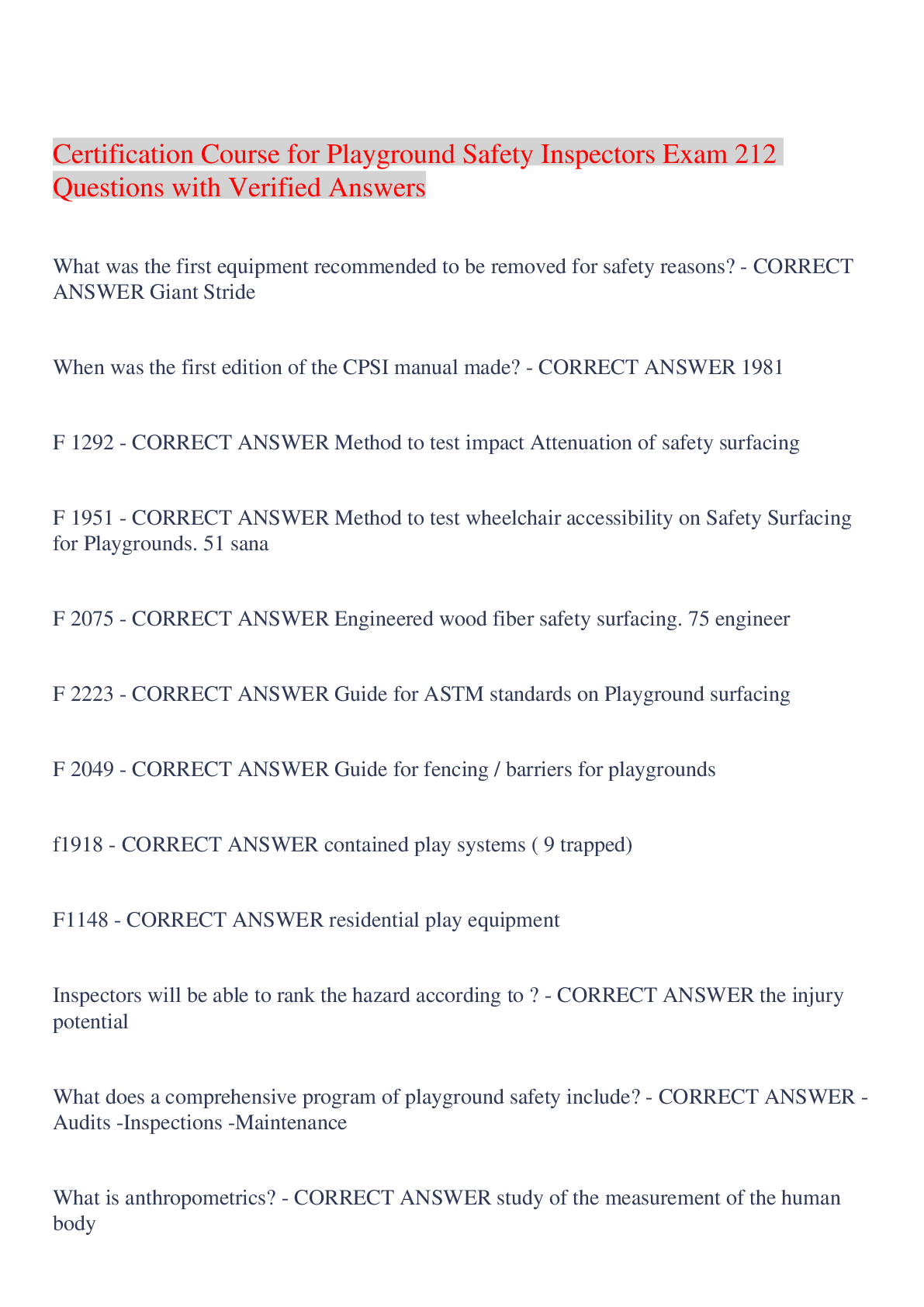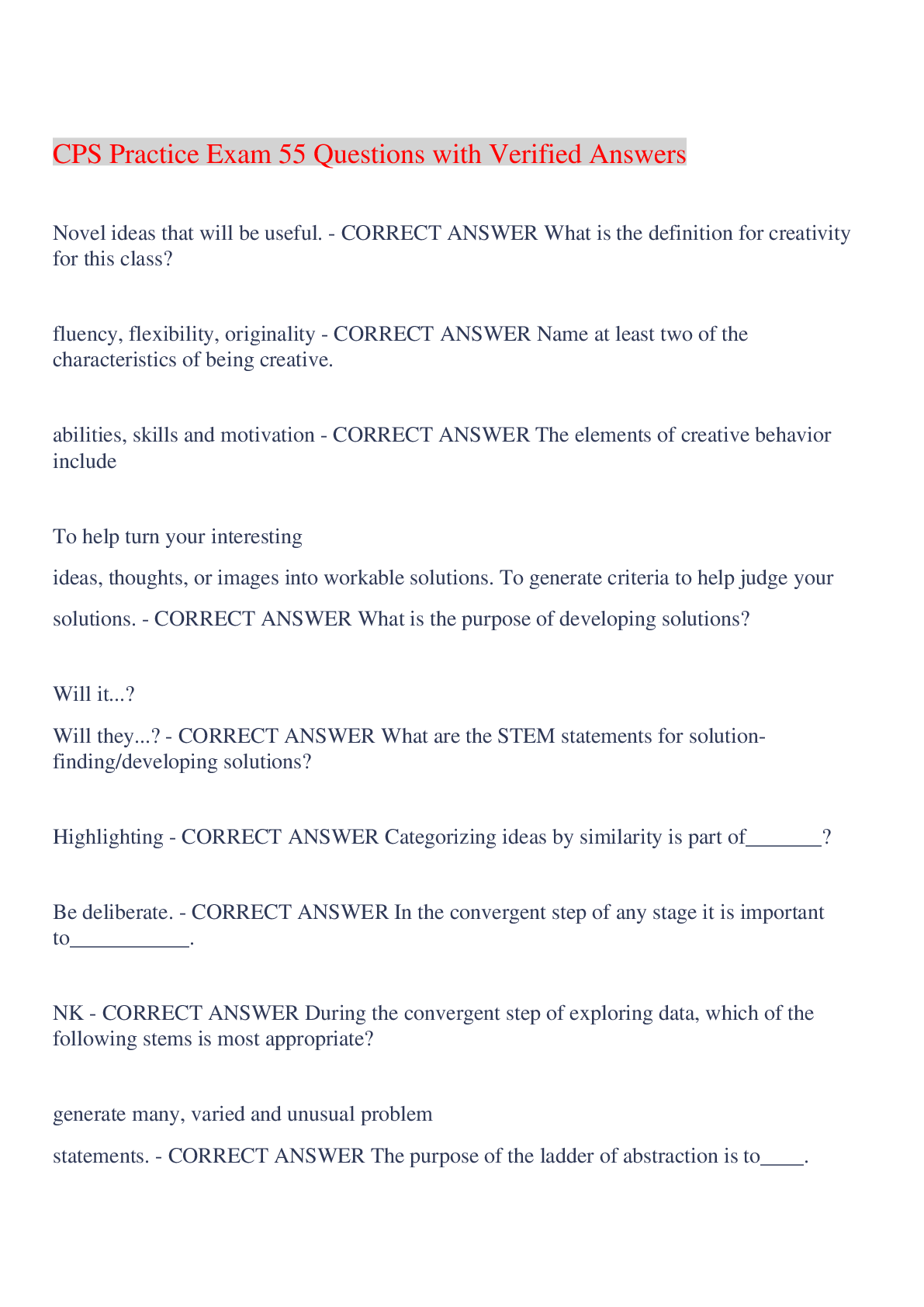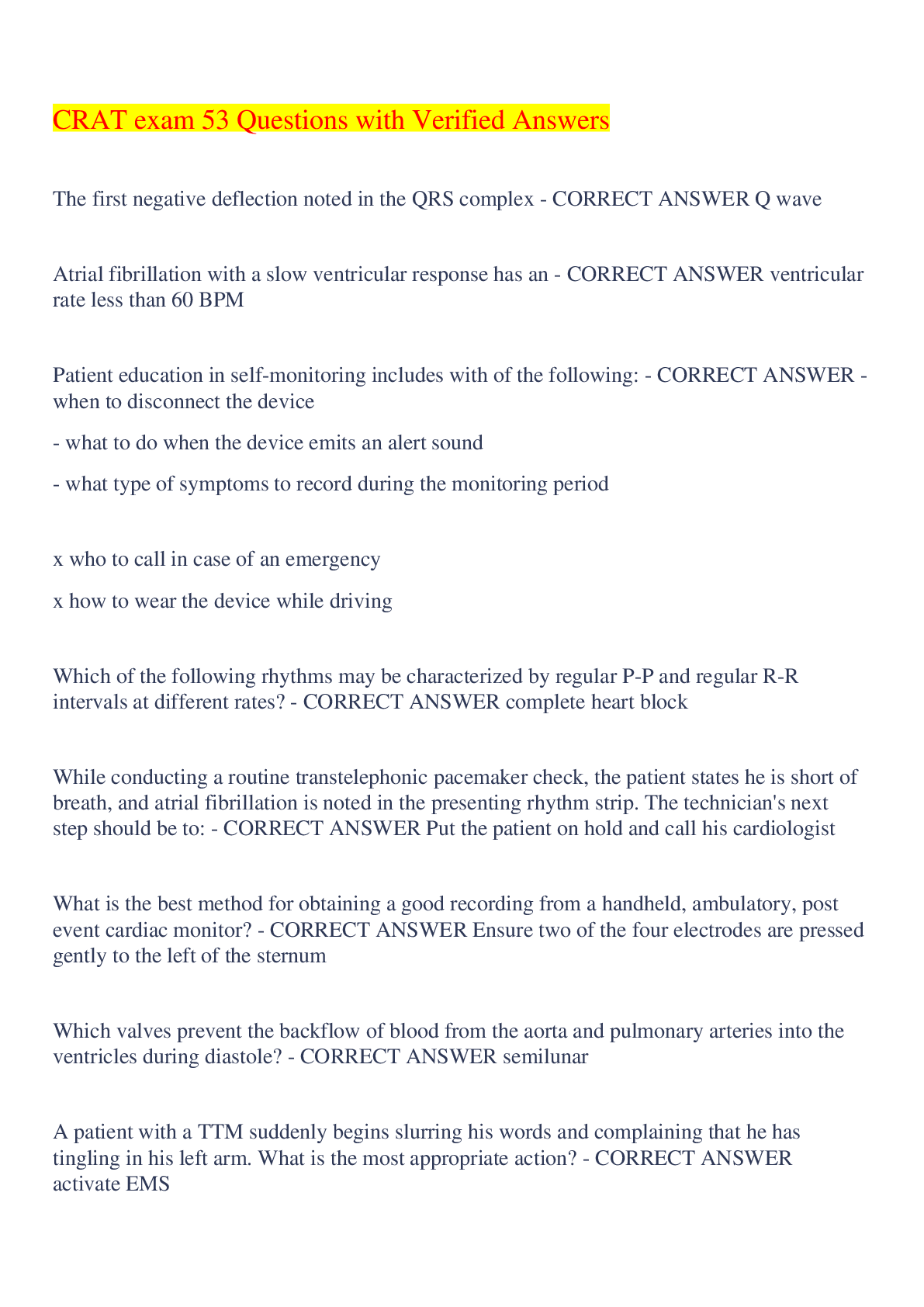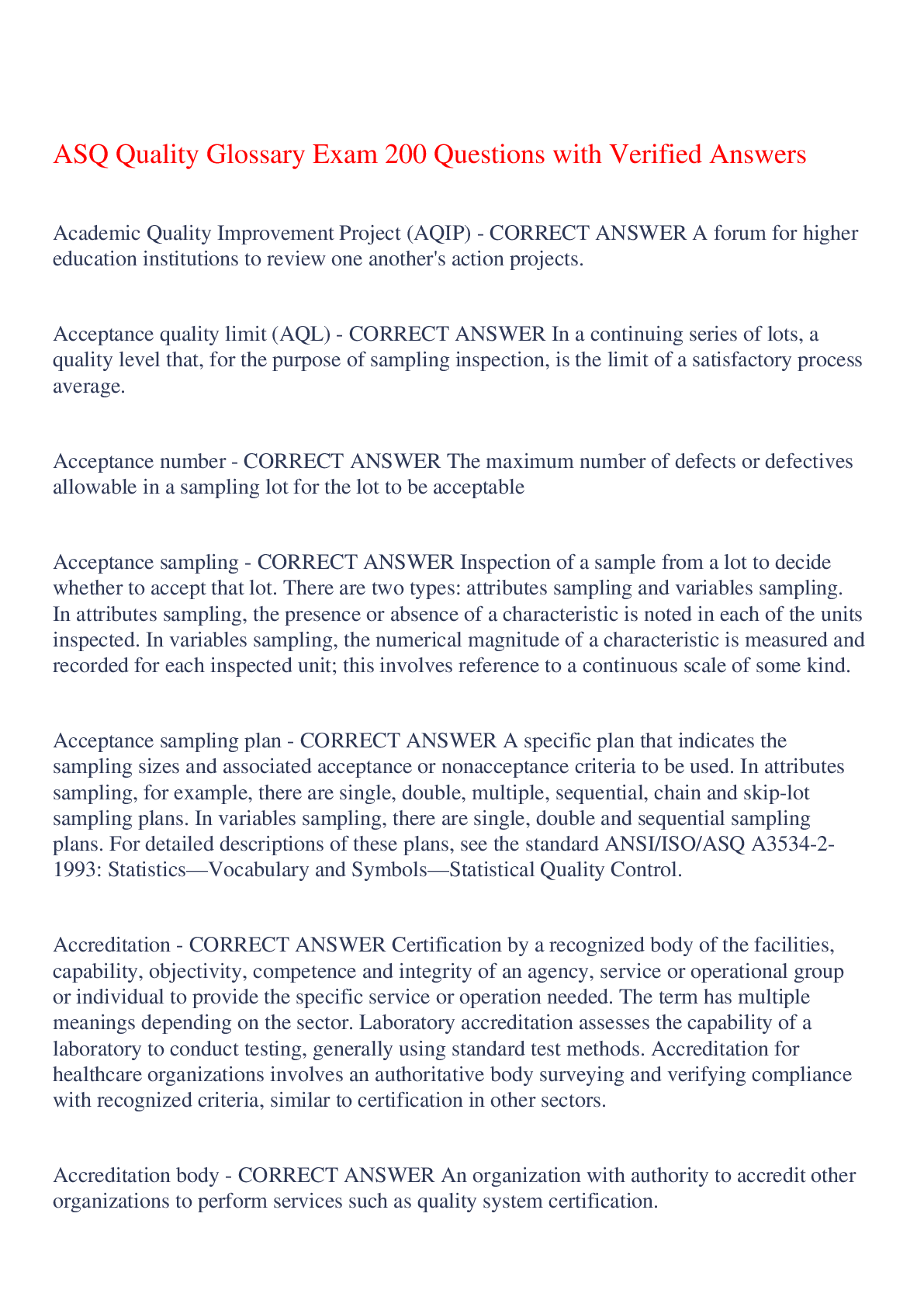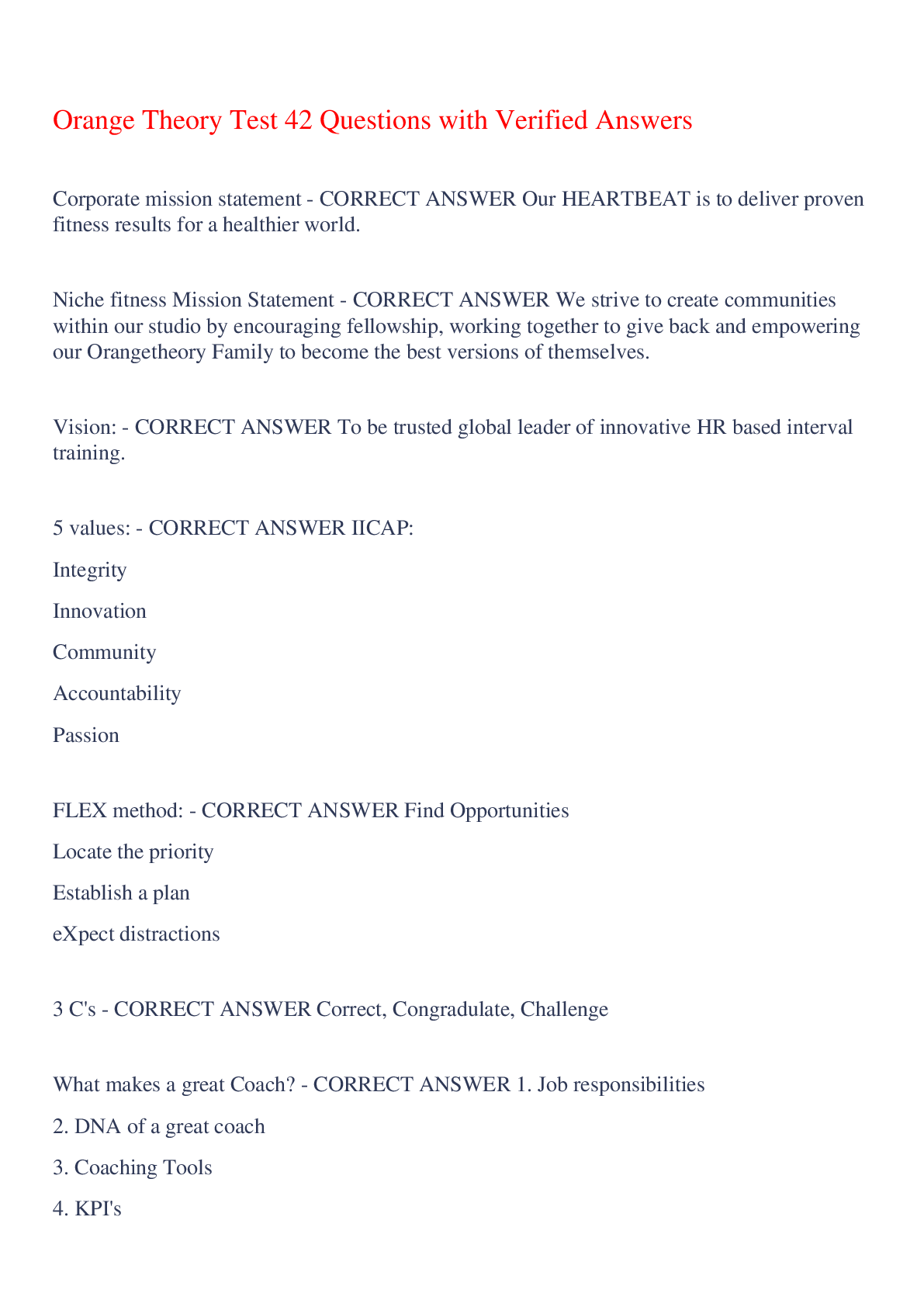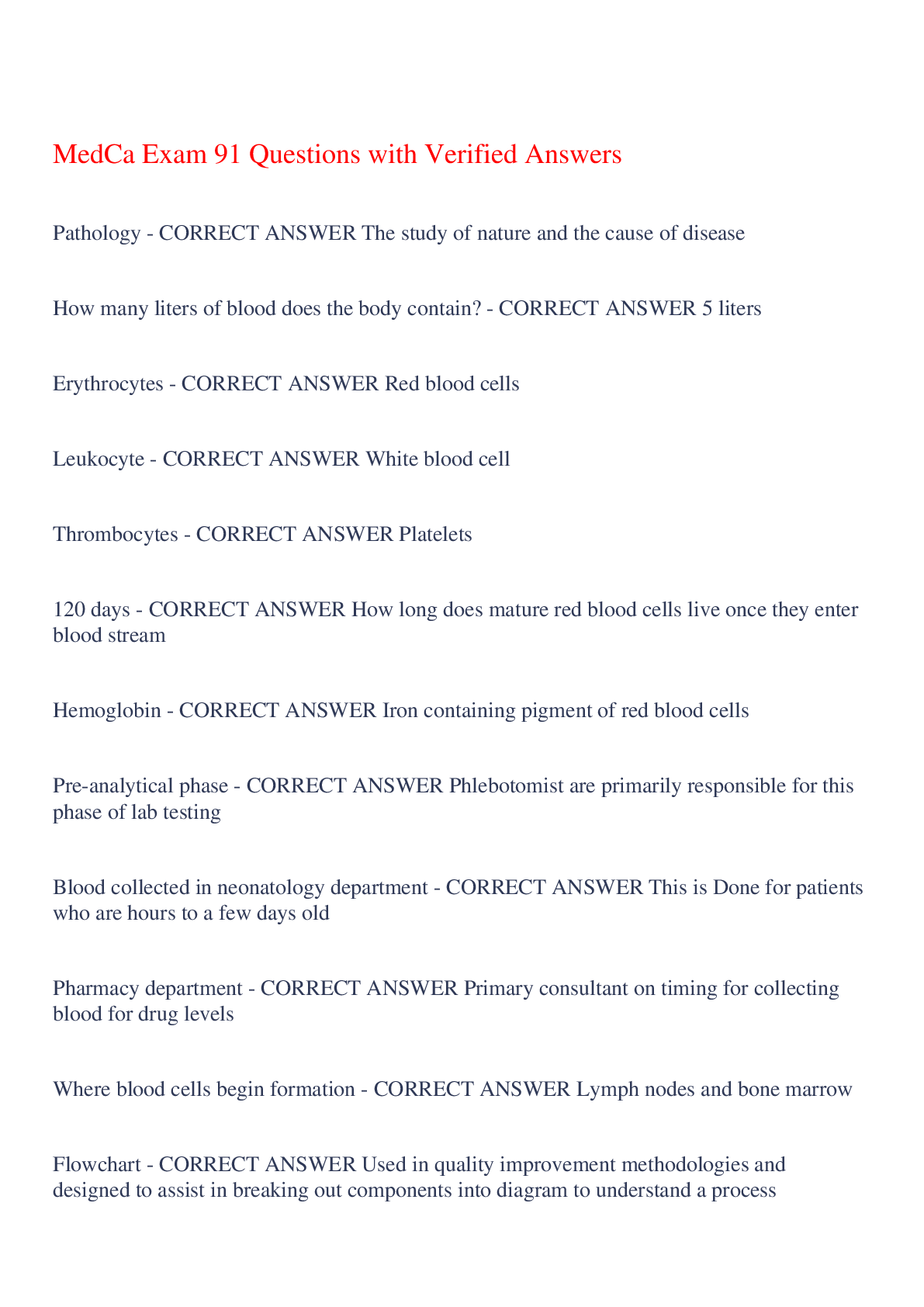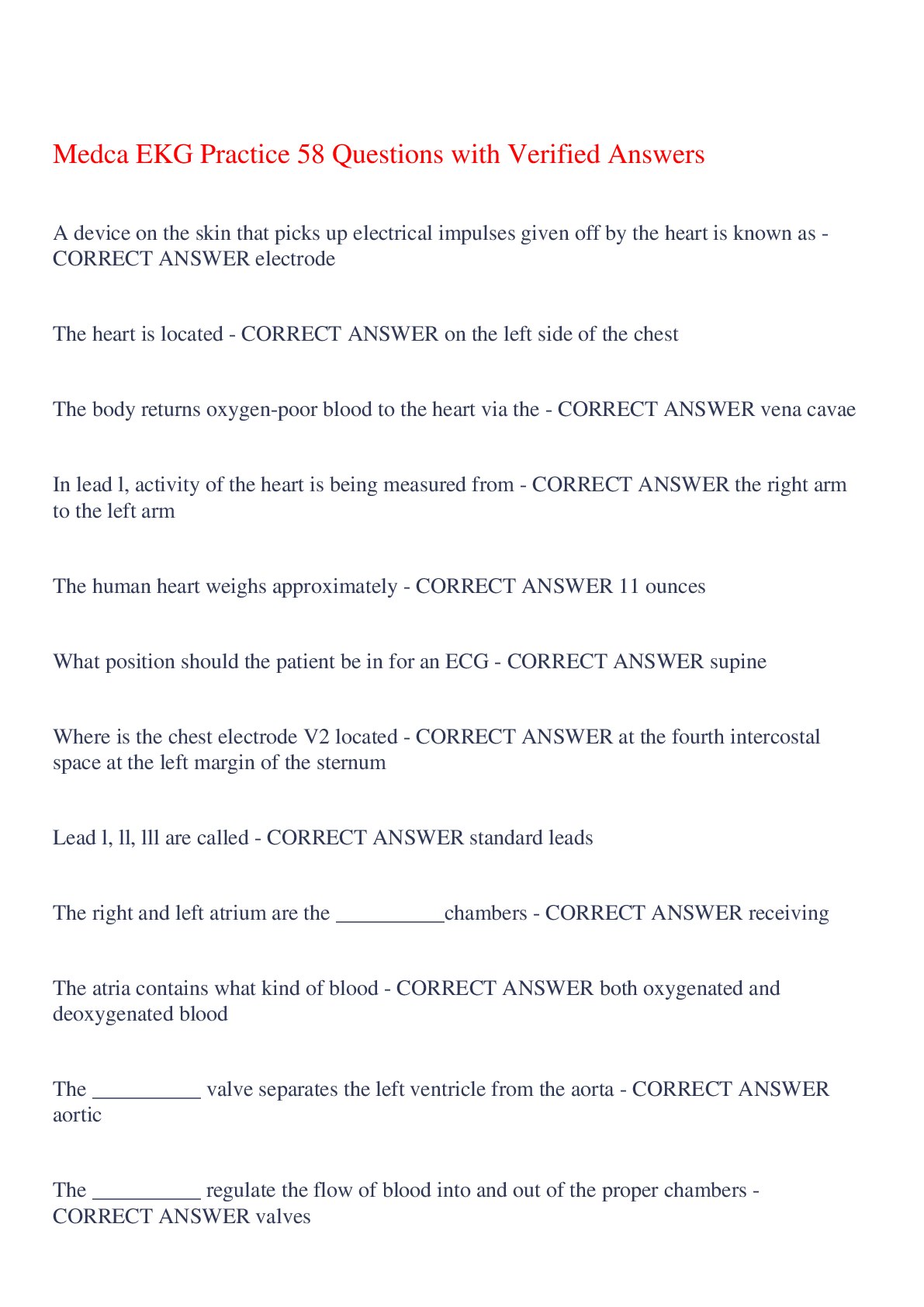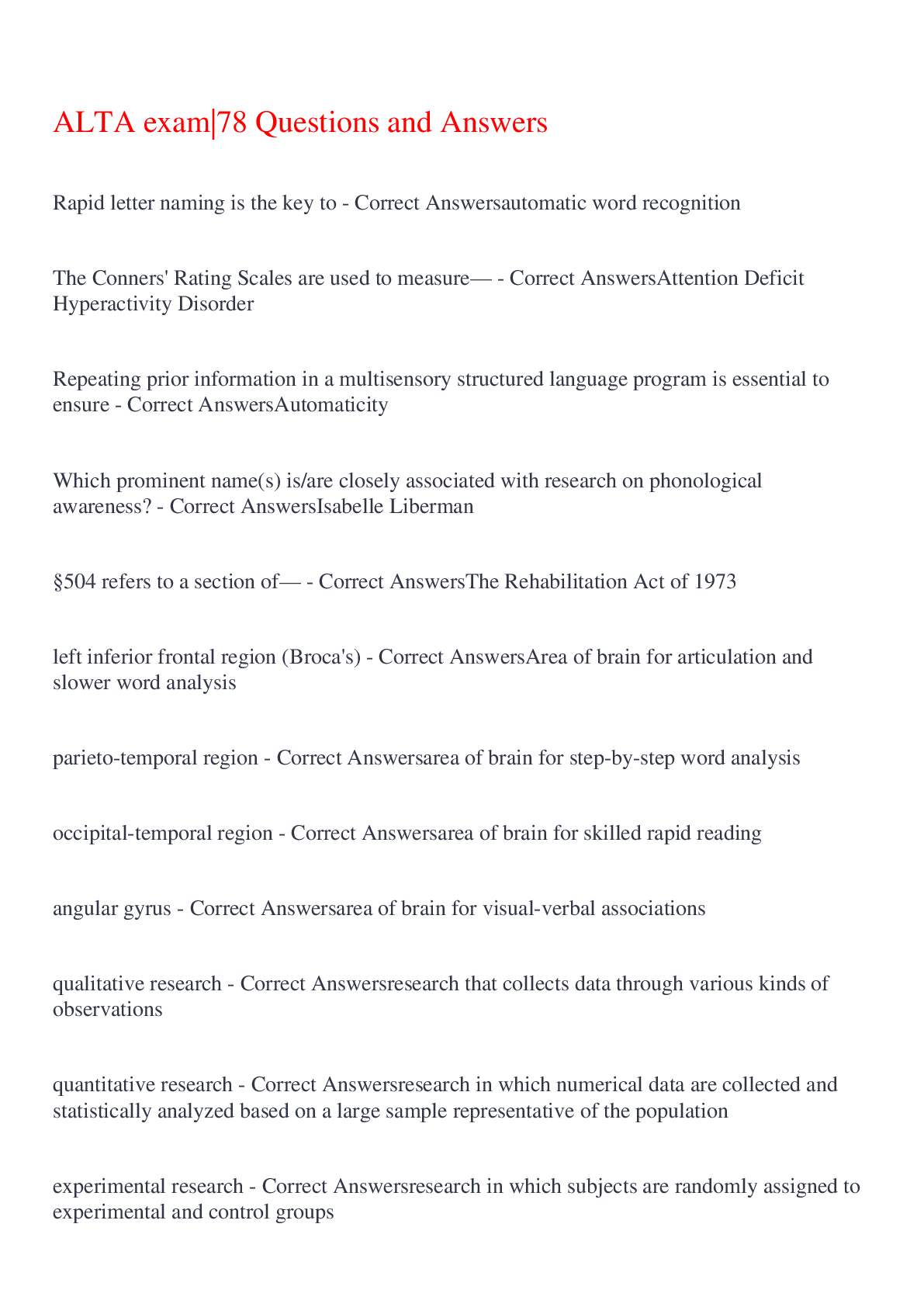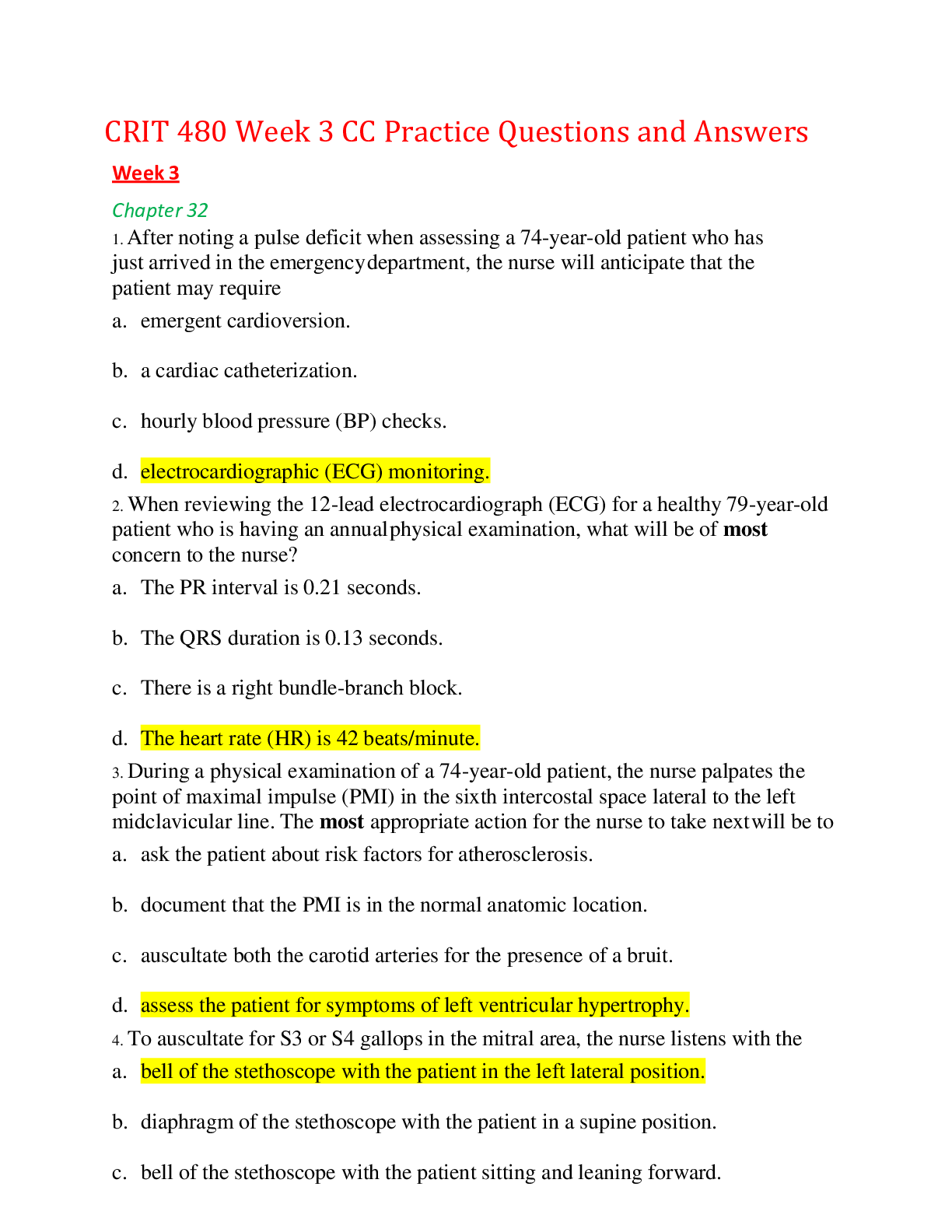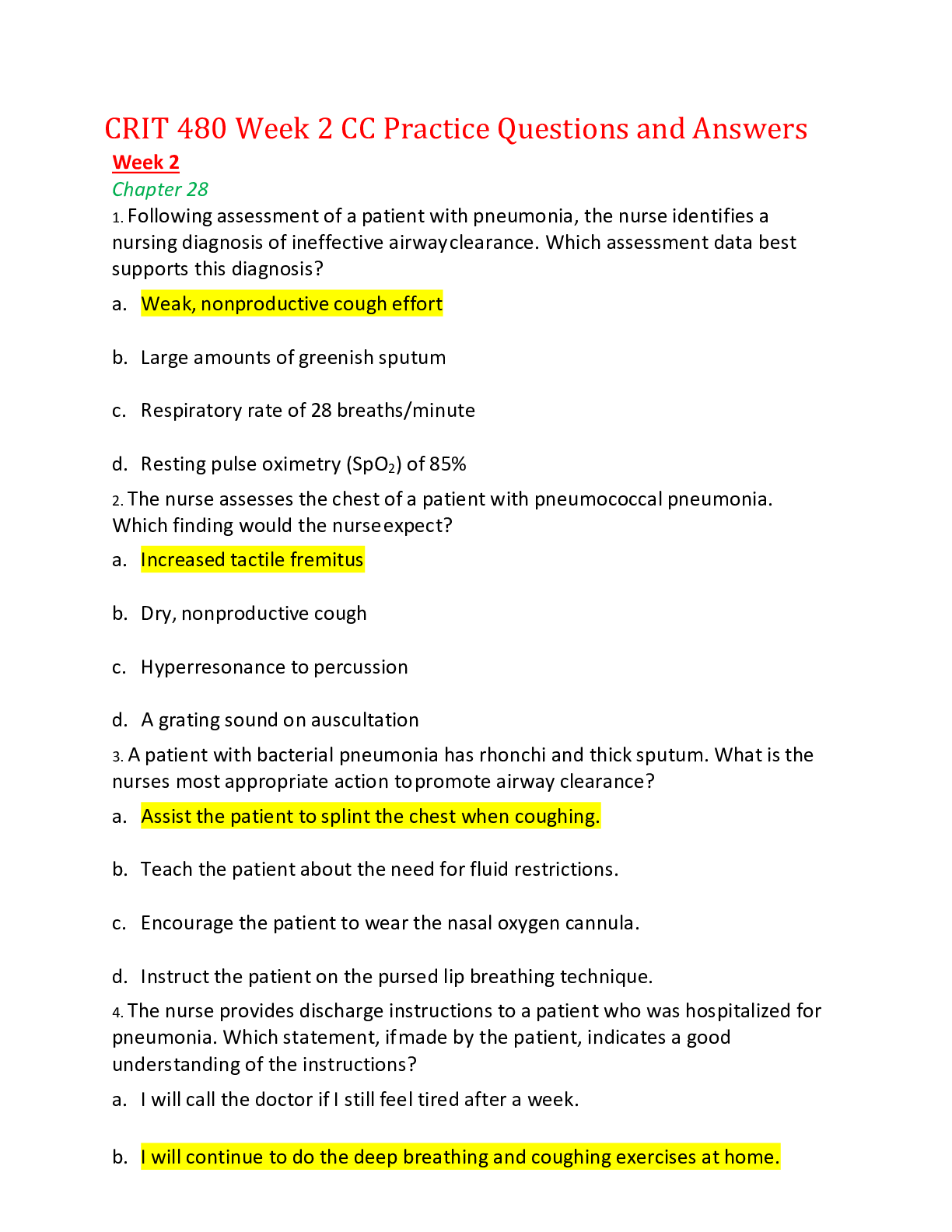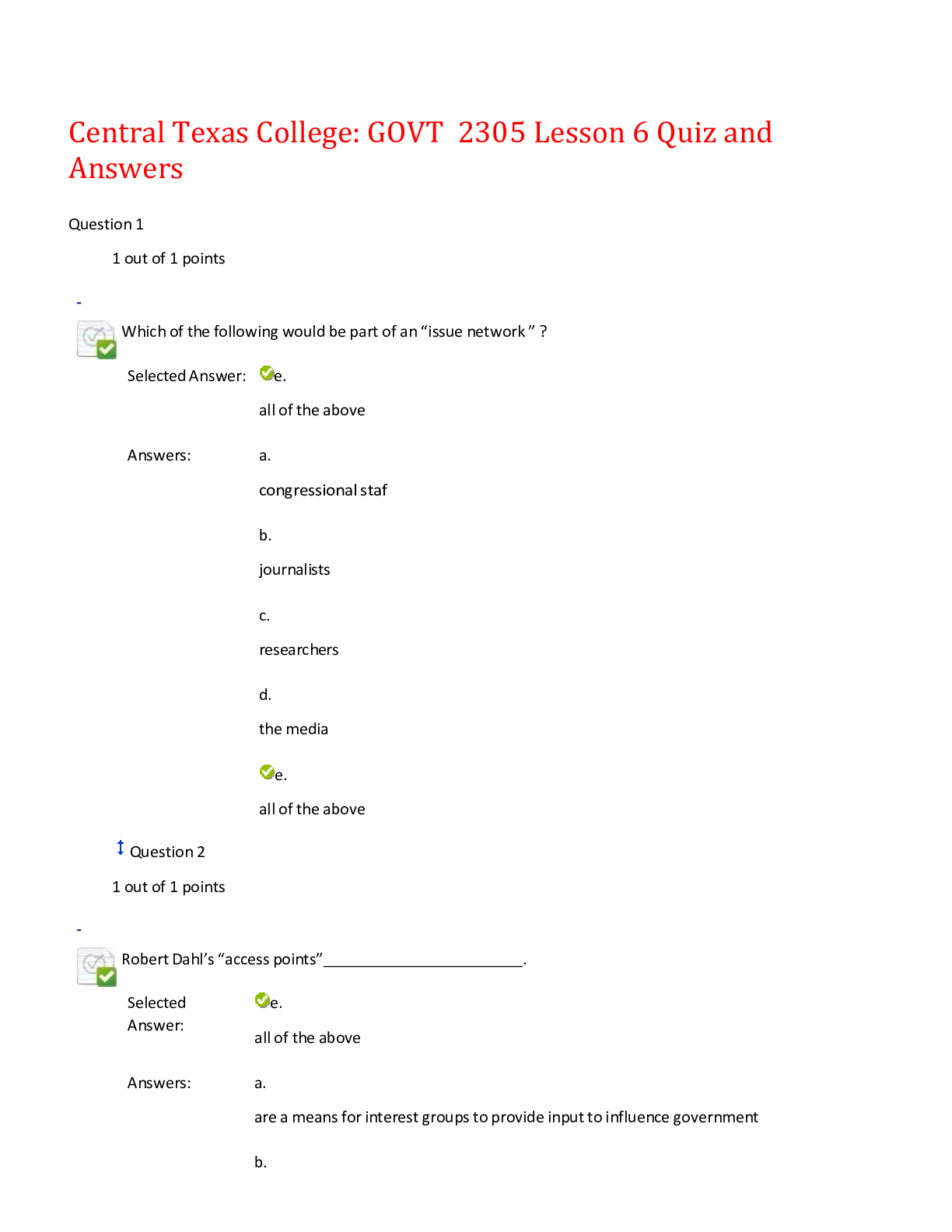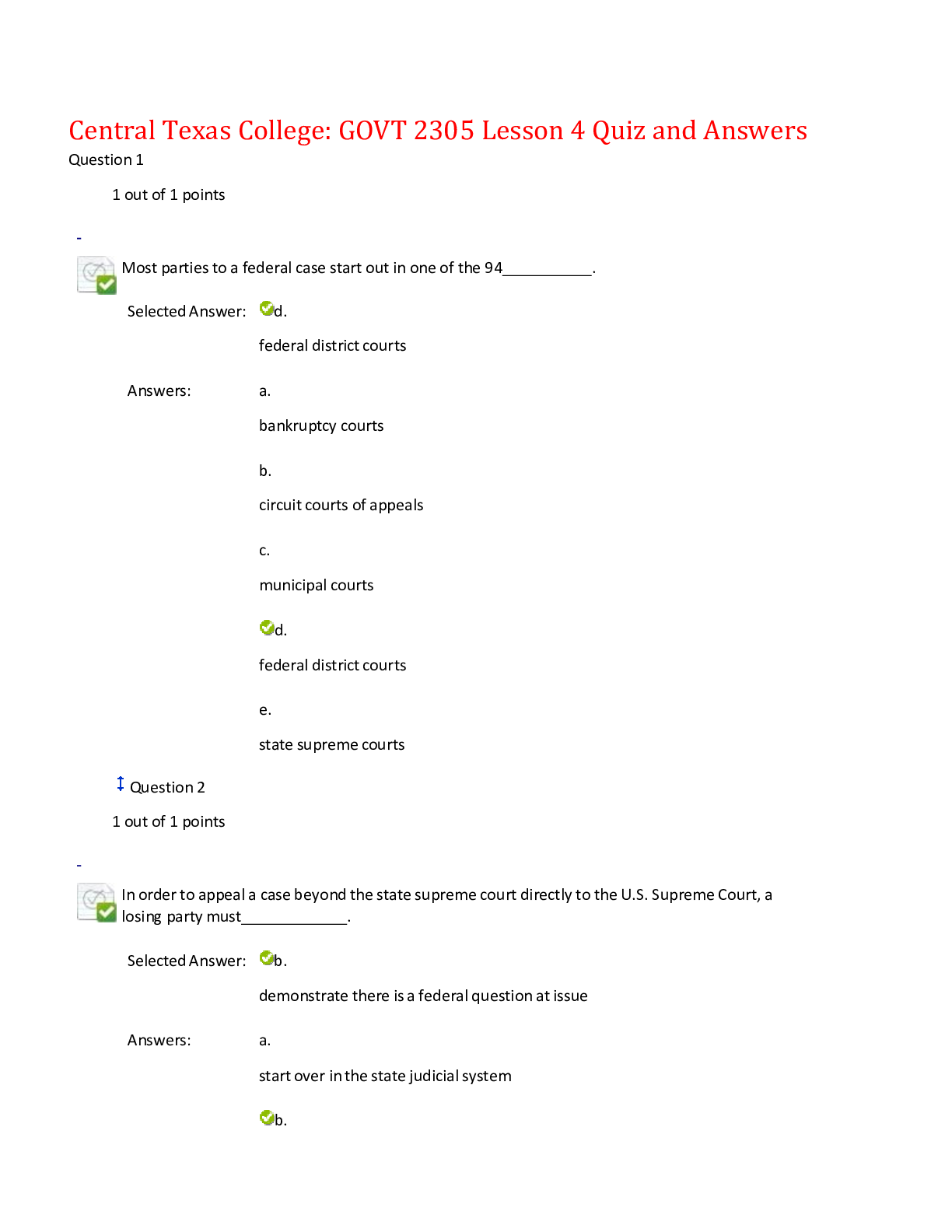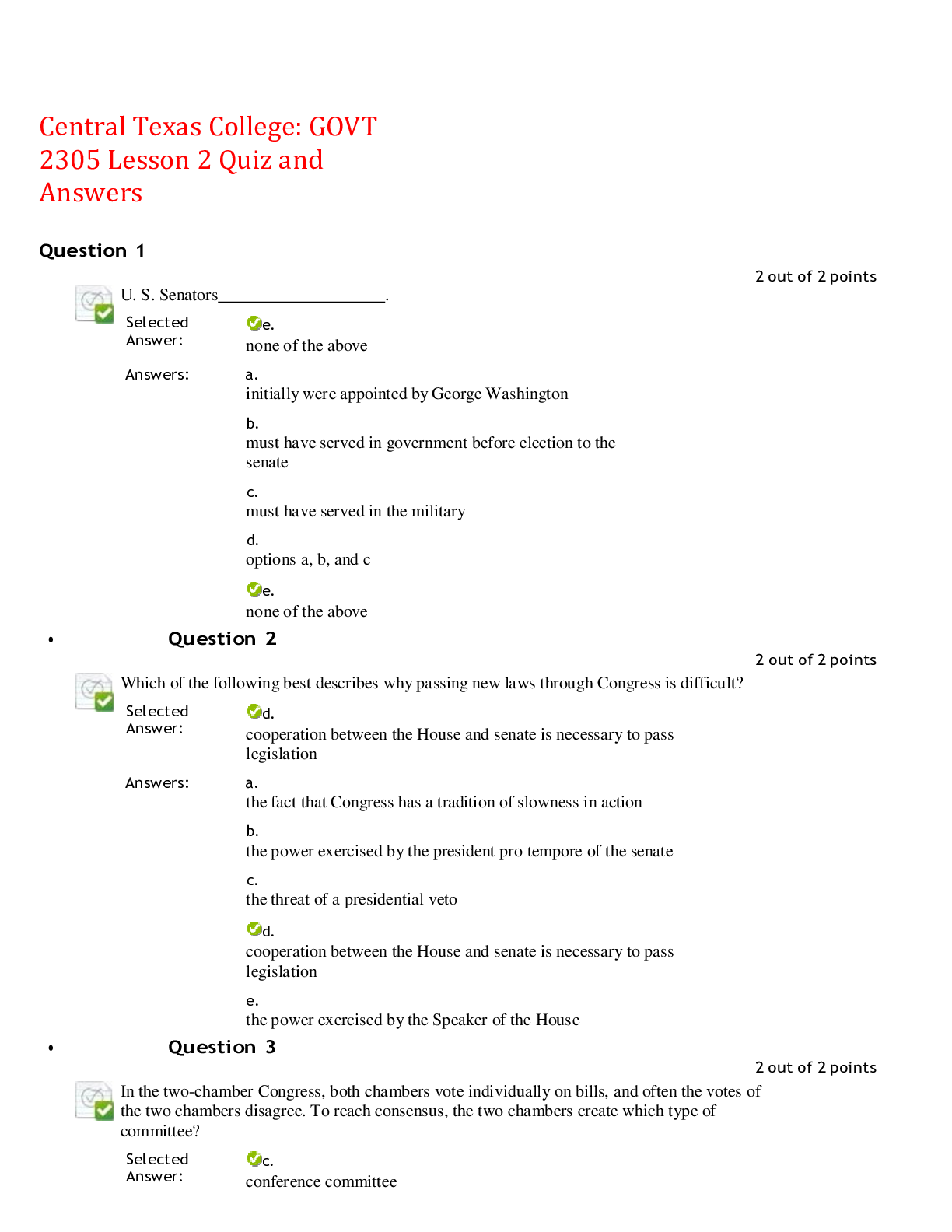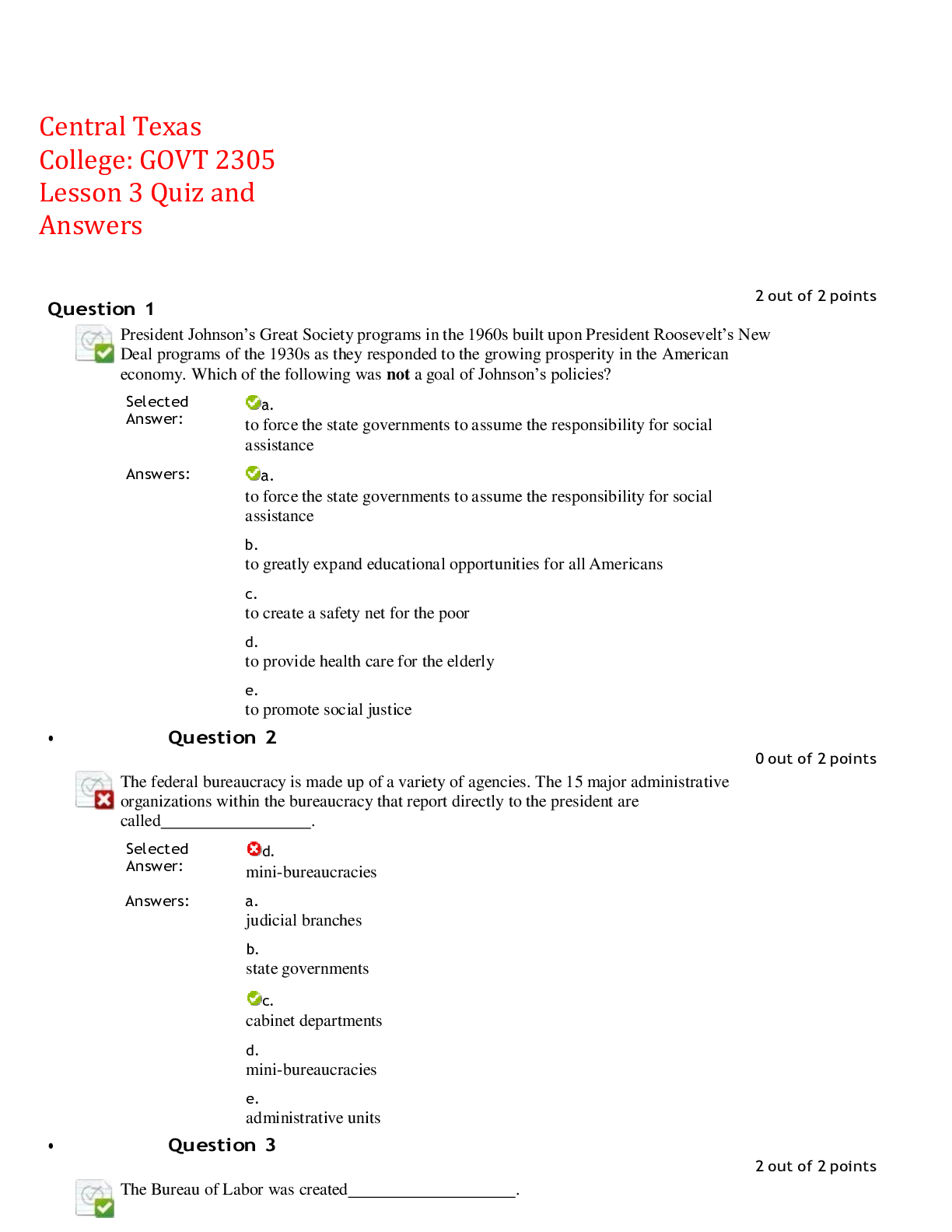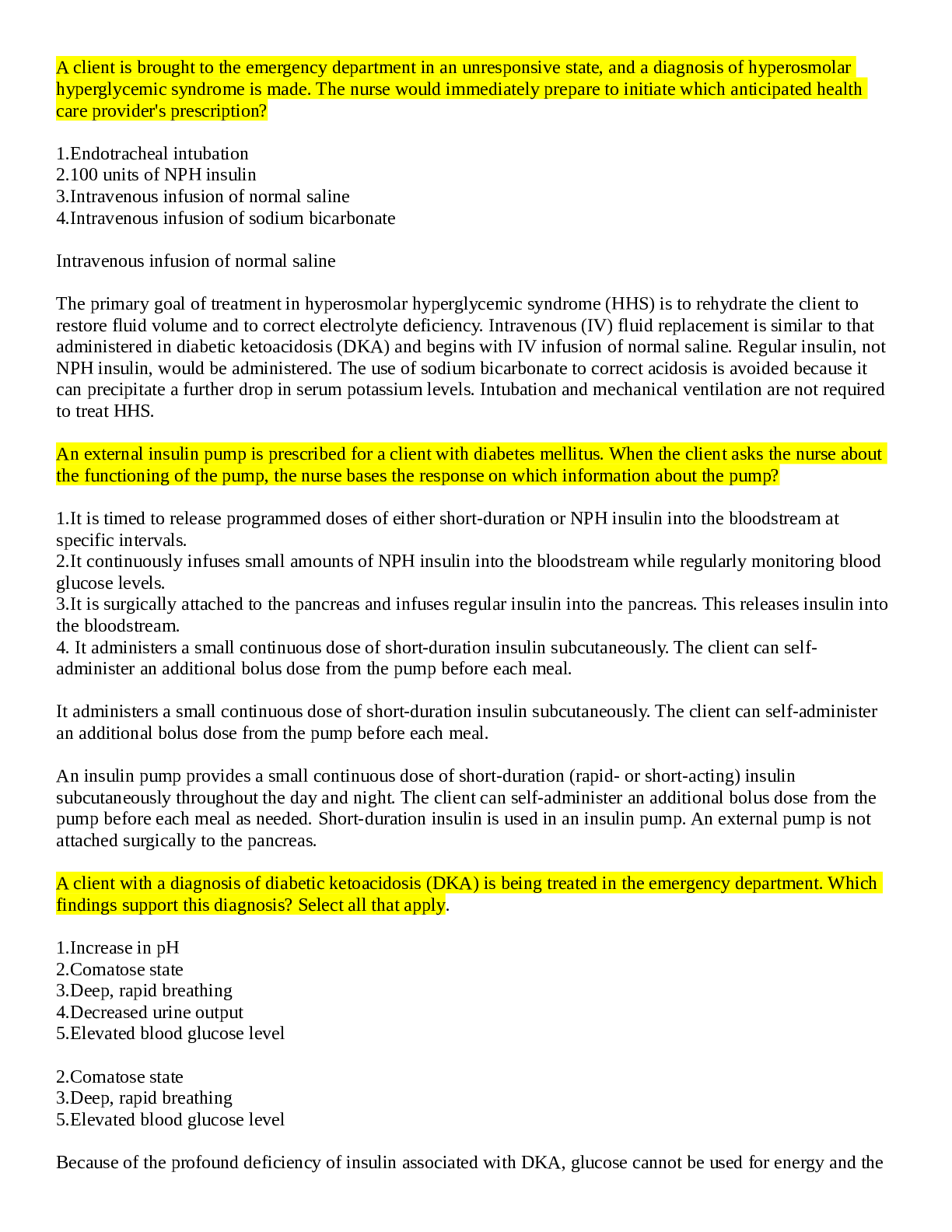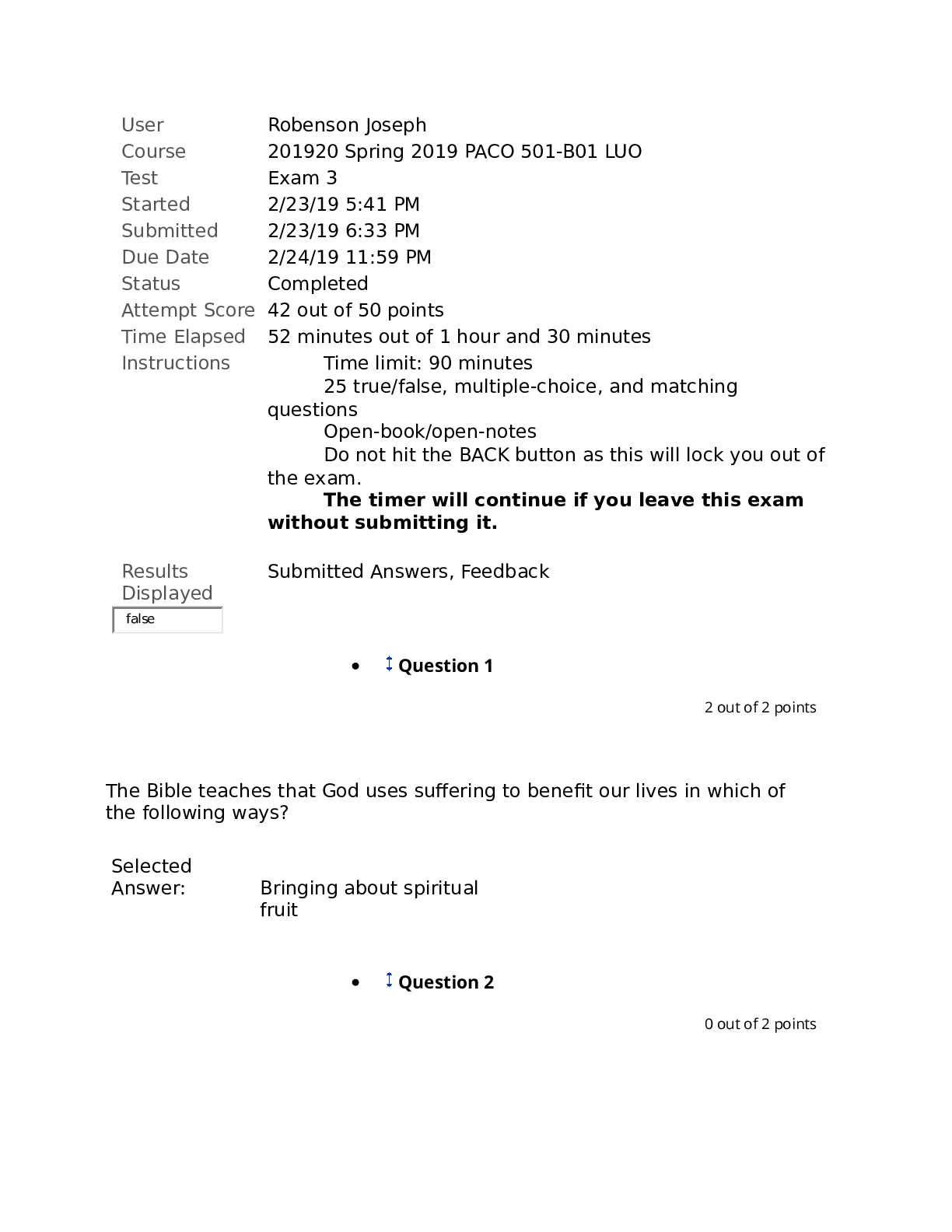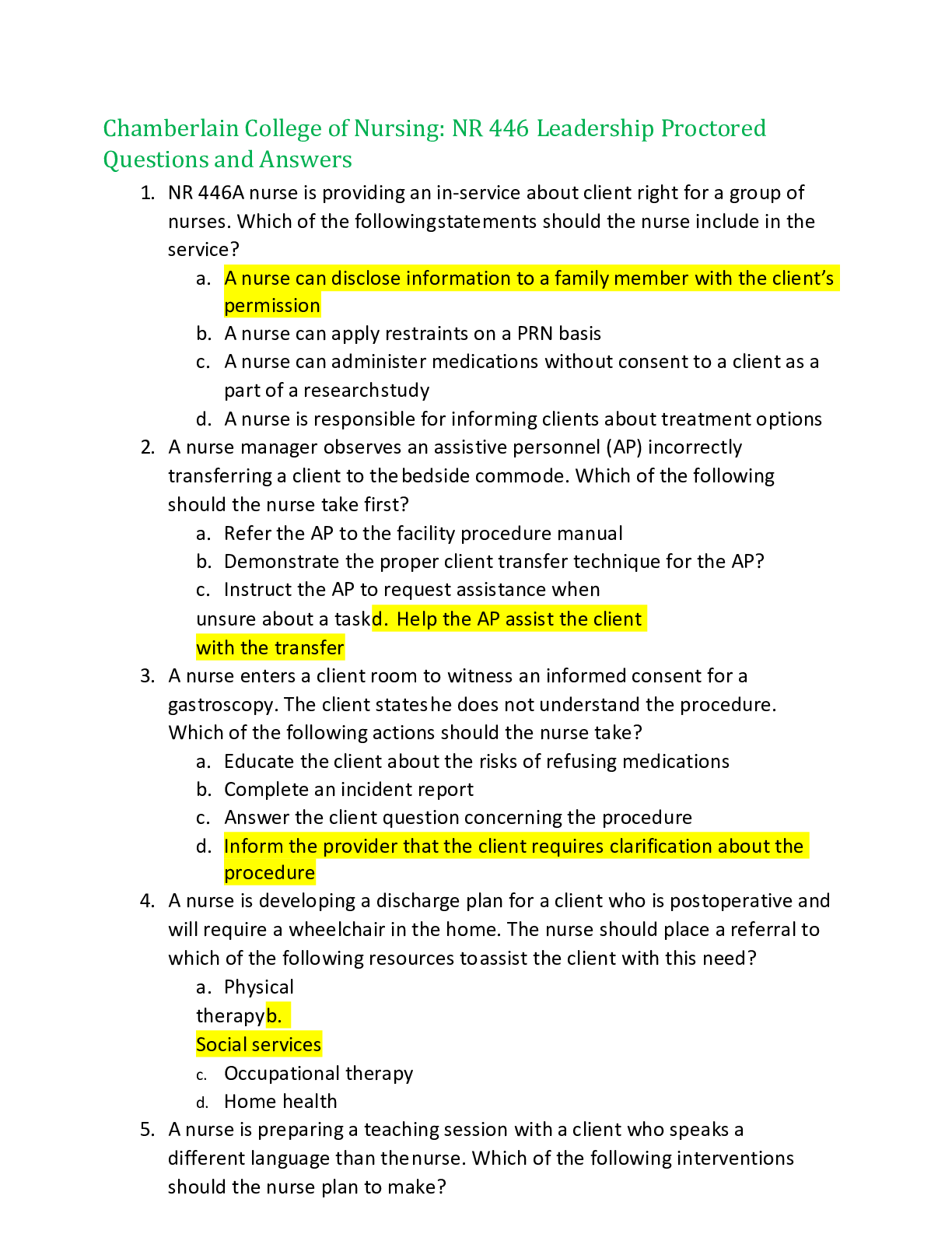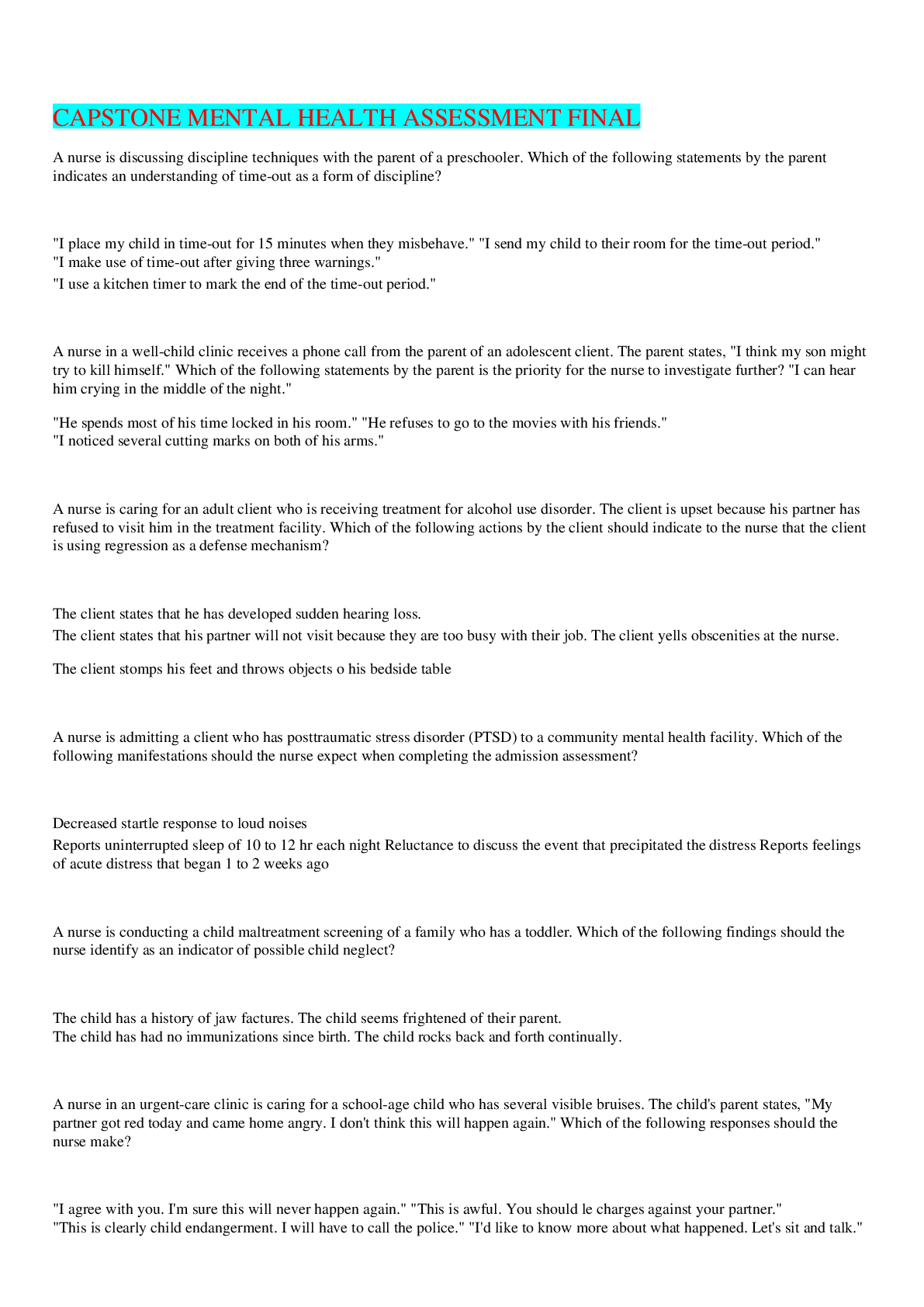Government > EXAM > Central Texas College: GOVT 2305 Lesson 5 Quiz and Answers,100% CORRECT (All)
Central Texas College: GOVT 2305 Lesson 5 Quiz and Answers,100% CORRECT
Document Content and Description Below
Central Texas College: GOVT 2305 Lesson 5 Quiz and Answers 1 out of 1 points As a supporter of the pacifist philosophy of Gandhi, Martin Luther King, Jr. advocated which of the following... tactics? Selected Answer: b. nonviolent civil disobedience Answers: a. legal boycott b. nonviolent civil disobedience c. litigation d. riot • Question 2 1 out of 1 points Not until were Native Americans as a whole granted full citizenship by the United States. Selected Answer: a. 1924 Answers: a. 1924 b. 1850 c. 1963 d. 1812 • Question 3 The Supreme Court’s ruling in “The Civil Rights Cases” held that . 1 out of 1 points Selected Answer: c. private individuals may discriminate on the basis of race Answers: a. the great body of civil rights lay under the protection of state governments, not the U.S. Constitution b. the doctrine of “separate but equal” was established c. private individuals may discriminate on the basis of race d. schools should desegregate “with all deliberate speed” e. the doctrine of “separate but equal” was invalid • Question 4 1 out of 1 points The subjective biases of male bosses that prevent women from receiving raises and promotions, is known as . Selected Answer: b. the glass ceiling Answers: a. rational basis scrutiny b. the glass ceiling c. intermediate scrutiny d. sexual harassment e. gender equality • Question 5 The purpose of an affirmative action program is to . 1 out of 1 points Selected Answer: a. create remedies for imbalances caused by previous discriminatory practices Answers: a. create remedies for imbalances caused by previous discriminatory practices b. establish quotas for all hiring and admission decisions c. require that the employment process be color blind and that race not be considered d. require federal government approval of all state hiring decisions e. encouraged lawsuits against private companies • Question 6 As one of the so-called Civil War Amendments, the Thirteenth Amendment served what purpose? 1 out of 1 points Selected Answer: b. the abolishment of the institution of slavery in the United States Answers: a. the right to vote for all citizens, including women b. the abolishment of the institution of slavery in the United States c. reconciliation of northern and southern states d. forgiveness for southern soldiers e. freedom of speech to all Americans • Question 7 Which of the following is an example of using organized protest, by a refusal to use certain goods, to advance civil rights? 1 out of 1 points Selected Answer: c. Montgomery bus boycott Answers: a. lynching b. cross burning c. Montgomery bus boycott d. filing lawsuits e. passing Jim Crow laws • Question 8 1 out of 1 points When Rosa Parks refused to give up her seat on a public bus, she was practicing which of the following tactics? Selected Answer: d. civil disobedience Answers: a. strike b. boycott c. litigation d. civil disobedience e. riot • Question 9 1 out of 1 points When reviewing cases dealing with discrimination, the Supreme Court standard that requires government to show that the classification is “substantially related to an important state interest,” is referred to as the . Selected Answer: b. Intermediate Scrutiny Standard Answers: a. Rational Basis Standard b. Intermediate Scrutiny Standard c. Strict Scrutiny Standard d. Minimum Scrutiny Standard e. Nondiscrimination Standard • Question 10 The Fourteenth Amendment provided . 0 out of 1 points Selected Answer: a. restitution to the freed slaves Answers: a. restitution to the freed slaves b. an opportunity for freed slaves to sue the states in which they were enslaved c. full U.S. and state citizenship to all persons born or naturalized in the United States as well as guaranteed equal protection of the laws d. for segregation of the races but equal treatment of both e. forgiveness for all Confederates • Question 11 Which of the following is not true of strict scrutiny? 1 out of 1 points Selected Answer: b. It is held at the same level of scrutiny as gender discrimination cases in the Supreme Court. Answers: a. It tends to invalidate almost all state laws that segregate racial groups. b. It is held at the same level of scrutiny as gender discrimination cases in the Supreme Court. c. It requires government to prove that the racial classification of the law or practice in question is “narrowly tailored” to meet a “compelling state interest.” d. It has been applied to decisions on segregated public swimming pools and interracial marriages. e. It was a legal standard set in Brown v. Board of Education. • Question 12 Abolitionists believed that the “fatal characteristic” of slavery was that it . 1 out of 1 points Selected Answer: b. denied slaves the right to own property and enter into contracts Answers: a. disallowed slaves the right to vote b. denied slaves the right to own property and enter into contracts c. did not provide slaves with social equality d. took jobs away from American citizens e. was too costly for southern plantation owners • Question 13 Which of the following is not found in the Fifth Amendment? 1 out of 1 points Selected Answer: d. protection against cruel and unusual punishment Answers: a. protection against double jeopardy b. right to grand jury c. self-incrimination clause d. protection against cruel and unusual punishment e. all of the above are included in the Fifth Amendment • Question 14 The idea that the suppression of free speech forces citizens to adopt more extreme means of enacting change and that promotion of free speech provides an essential mechanism for 1 out of 1 points balancing the need for order with advocacy of reform is an example of . Selected Answer: a. a “safety valve” Answers: a. a “safety valve” b. the “marketplace of ideas” c. self-governance d. self-fulfillment e. “clear and present danger” • Question 15 The Sixth Amendment guarantees . 1 out of 1 points Selected Answer: c. “In all criminal prosecutions, the accused shall . . . have the assistance of Counsel for his defense.” Answers: a. “Excessive bail shall not be required, nor excessive fines imposed, nor cruel and unusual punishments inflicted.” b. “The right of the people to be secure in their persons, houses, papers and effects, against unreasonable searches and seizures, shall not be violated, and no Warrants shall be issued, but upon probable cause.” c. “In all criminal prosecutions, the accused shall . . . have the assistance of Counsel for his defense.” d. “A well regulated militia, being necessary to the security of a free State; the right of the people to keep and bear Arms shall not be infringed.” e. “No person shall be held to answer for a capital, or otherwise infamous crime, unless on a presentment or indictment of a grand jury . . . nor shall any person be subject for the same offense to be twice put in jeopardy of life or limb; nor shall be compelled in any criminal case to be a witness against himself.” • Question 16 As explained in Federalist 14, why did Madison believe an enumeration of a Bill of Rights was not necessary in the Constitution? 1 out of 1 points Selected Answer: c. Government was limited to enumerated powers and therefore had no power to infringe on liberties. Answers: a. The federal government should not be limited in its actions. b. People did not possess liberties. c. Government was limited to enumerated powers and therefore had no power to infringe on liberties. d. The Constitution left all power to the states. e. Individual liberties should not be protected from government action. • Question 17 1 out of 1 points In the 1940s and 1950s, members of the Communist party were convicted for their advocacy of , or the overthrow of an existing system of government. Selected Answer: a. sedition Answers: a. sedition b. anarchy c. internment d. passive resistance e. terrorism • Question 18 “Natural rights” . 1 out of 1 points Selected Answer: d. options a, b, and c are true Answers: a. cannot be denied by a government b. exist even in the absence of government c. are “inalienable” d. options a, b, and c are true e. none of the above • Question 19 Federalist No.14 states that . 1 out of 1 points Selected Answer: d. the federal government has “jurisdiction limited to certain enumerated objects” Answers: a. individual rights are only “the fruits, rather than the roots, of the Constitutional tree” b. that the bill or rights of state governments already protected citizens against government encroachment c. all people possess “inalienable rights” d. the federal government has “jurisdiction limited to certain enumerated objects” e. when a government created by the “consent of the governed” fails to protect basic rights, the people have the right to “alter or abolish such government” • Question 20 In the twentieth century, the Supreme Court became increasingly more willing to protect individuals against intrusive state actions. What instrument gave the Supreme Court this authority? 1 out of 1 points Selected Answer: a. the Fourteenth Amendment, which guaranteed due process of law by the states Answers: a. the Fourteenth Amendment, which guaranteed due process of law by the states b. the free exercise clause c. the Civil Rights Act of 1871 d. the First Amendment, which guaranteed freedom of speech e. the Alien and Sedition Acts • Question 21 1 out of 1 points In very limited cases, the courts may impose a limit on publication before certain material has actually been published. This order of not to publish is called . Selected Answer: a. prior restraint Answers: a. prior restraint b. judicial censorship c. judicial discretion d. cease and desist e. libel diversion • Question 22 The “compelling state interest” test is a standard that . 1 out of 1 points Selected Answer: e. all of the above Answers: a. is determined by the Court b. requires government to show a program would be significantly undermined by providing religious exemptions c. the Court established in the case, Sherbert v. Verner d. was replaced in 1990 by the Smith case e. all of the above • Question 23 1 out of 1 points In several landmark cases in 1962, 1963, and 1985, the Supreme Court addressed the issue of prayer in public school classrooms. What is and has been the opinion of the Supreme Court in this matter? Selected Answer: b. Public schools may not compose and lead students in prayer as part of an official school program. Answers: a. Community religious leaders have a limited right to advise school officials on religious activities and teachings in the public schools. b. Public schools may not compose and lead students in prayer as part of an official school program. c. Elementary schools may not advocate or require participation in prayer or bible study, but high schools are exempted because of the maturity level of the students. d. Each school district must look to its community standards concerning religion and follow the majority of public opinion. e. Though such prayer was once disallowed, the conservative sweep of the Supreme Court after the 2004 presidential elections has led to its overturning the ban on school prayer. • Question 24 What is the purpose of the establishment clause of the First Amendment? 1 out of 1 points Selected Answer: e. It prohibits the government from establishing an official religion for the country. Answers: a. It ensures that any and all religious beliefs have equal and full support of the federal government. b. It prohibits the display of any religious symbols, gestures, or thoughts at any level of government. c. It requires Congress to establish a national religion to be used as a foundation for other religious efforts. d. It establishes Christianity as the national religion, in keeping with the beliefs of the founding fathers. e. It prohibits the government from establishing an official religion for the country. • Question 25 In which of the following cases did the Supreme Court incorporate the Fourth Amendment? 1 out of 1 points Selected Answer: c. Mapp v. Ohio Answers: a. McDonald v. Chicago b. Texas v. Johnson c. Mapp v. Ohio d. Gitlow v. New York e. Katz v. United States [Show More]
Last updated: 1 year ago
Preview 1 out of 11 pages
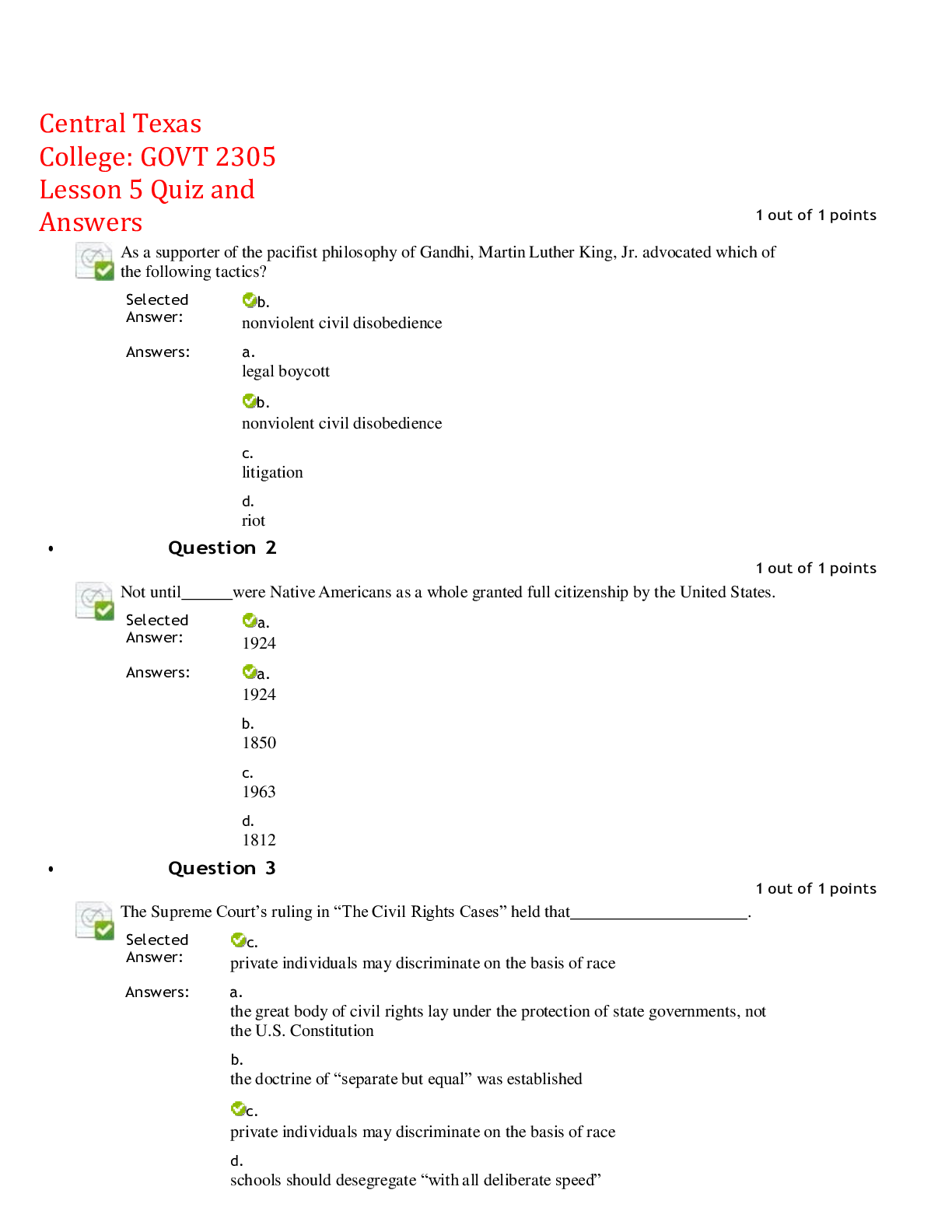
Reviews( 0 )
Document information
Connected school, study & course
About the document
Uploaded On
Aug 12, 2022
Number of pages
11
Written in
Additional information
This document has been written for:
Uploaded
Aug 12, 2022
Downloads
0
Views
59
